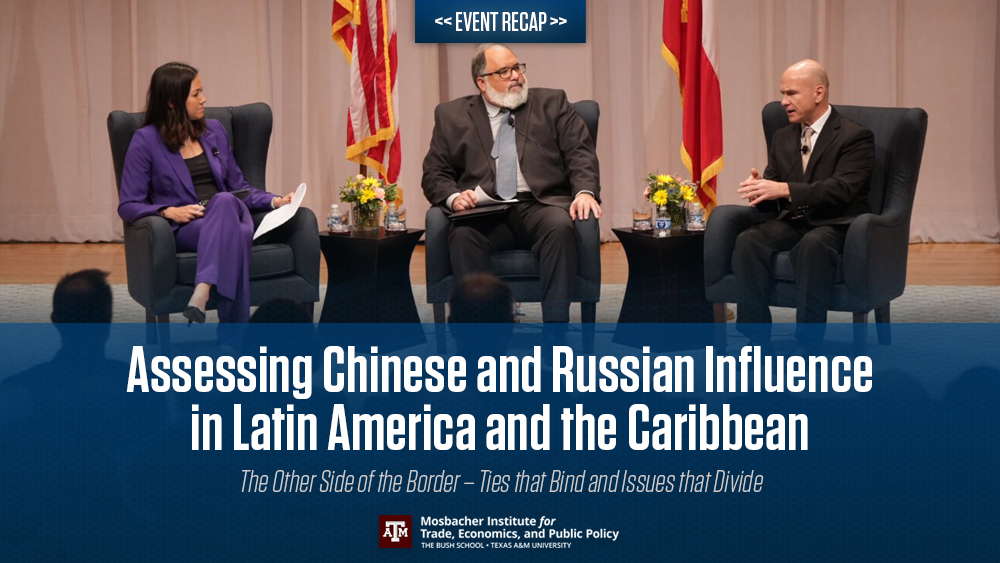
On March 30, 2023, the Mosbacher Institute’s Borders and Migration Program hosted Mr. Juan Cruz, director of the Argentina-U.S. Strategic Forum at the Center for Strategic and International Studies, and Dr. Evan Ellis, professor of Latin American studies at the U.S. Army War College Strategic Studies Institute, to participate in a panel talk on “Assessing Chinese and Russian Influence in Latin America and the Caribbean.” The event was part of The Other Side of the Border: Ties that Bind and Issues That Divide speaker series organized by Bush School Assistant Professor Aileen Teague, who also served as moderator.
Dr. Teague introduced the audience to the topic, focusing on China’s expanding presence throughout the region and describing how over the past two decades, China has increased commercial investments and diplomatic exchanges across Latin American and Caribbean countries and currently remains the top trade partner with every country in the region south of Costa Rica. Throughout the event, Cruz and Ellis brought academic and practitioner insight on the issue and what China’s expanding presence means for U.S. foreign policymakers moving forward in a geopolitical environment that rings alarm bells similar to those of the Cold War era.
China’s evolution of engagement has outpaced any other foreign actor, sparking questions regarding its intentions and what that means for U.S. interests in the Western hemisphere. Ellis claimed China’s increased investment in strategic minerals, commodity markets, infrastructure projects, and domination of digital technology markets, including telecommunications and surveillance in the region, stems from its motivation to control global connectivity in pursuit of its own domestic interests. The speakers also noted that not all of China’s financial investments and infrastructure projects are negative, as some can benefit Latin American countries’ economic development. Yet, they also noted this economic engagement does not exist in isolation, as it allows room for increased political influence and coercion. This political influence is exemplified in the increasing derecognition of Taiwan by various countries across the region. Additionally, both speakers highlighted the increase in Chinese and Russian espionage activity, illicit businesses, money laundering, and strategic use of multilateral forums outside existing Western-centric organizations resulting from China’s and Russia’s enhanced presence.
Cruz highlighted how the U.S. government’s failing to engage with its Latin American and Caribbean partners economically and diplomatically have hurt U.S. economic and political interests. The United States left a gap, and China’s strategic maneuvering filled it. U.S. foreign policymakers also remain disadvantaged in competing with Chinese financial investment as it is challenging to encourage U.S. private investment in countries engulfed in corruption and economic and political instability. Ellis, however, noted that not all hope is lost for advancing the United States’ position relative to China’s.
View the panel discussion on the Bush School YouTube Channel
In the face of increasing Chinese competition, the speakers advised that the United States should refrain from engaging in an ongoing tit-for-tat investment spending spree while trying to dictate Chinese-Latin American and Caribbean relationships. Instead, the United States must build upon its values-based approach as the best way to match China and Russia’s influence. Specifically, the United States should advocate for institutions, rule of law, respect for human rights, and transparency while advancing Latin American and Caribbean development projects with improved project planning, technical development capabilities, and legal frameworks. With increased engagement, interest, and investment in the Latin American and Caribbean region, the United States will enhance its ability to convince its partners in the Western Hemisphere that doing business with the United States versus China is beneficial for both U.S.-Latin American and Caribbean relations and for the people and future of Latin America and the Caribbean.

